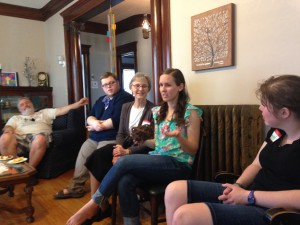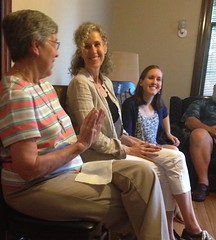If the following characteristics gathered during Phase II discussions of the Resident Visitation Lay Community Invitation inspire and call you, think about, pray about commitment:
- Relational, by being residential and in the midst of the neighborhood;
- Mutual, in living as well as in decision-making;
- Dedicated, to Gospel living through the lens of love inspired by Salesian spirituality;
- Stable, through the stability of a life lived by “being where you are and being there well”;
- Prayerful, in personal prayer and solitude to “know who you are and be that well”;
- Prayerful, in communal prayer with faith sharing for support in laying down life in the dailiness and ordinariness;
- Diverse, by living into and learning that diversity is our most valuable resource for moving us into the oneness into which we are baptized;
- Inclusive, in respecting all others by affirming their dignity and creating a place for their belonging in the oneness with which God gifts us.
Possible ways the Sisters might support the common good could include providing a facilitator for communication; installing a security system; forming a 501c3; exploring medical insurance; funding community educational opportunities. Community members would be responsible for funding their own lifestyle, housing, utilities, transportation, and insurance. The lay community’s presence in the neighborhood would require ongoing study of resources and learning from the neighbors in order to facilitate connectedness in north Minneapolis. In living near to us, they would join us for prayer when possible, enjoy an occasional dinner, participate in Salesian studies and other related topics along with reviewing the Sisters’ call to affirm the place of the laity.
The call gleaned by the Sisters from the Phase I listening sessions added depth to the vision of a residential Visitation Lay Community and is very specific:
- To strengthen their legacy from Francis de Sales that “all are called to holiness;”
- To support the laity in a way of evangelization for our time;
- To affirm the moral authority of the laity;
- To be with the laity in their leavening-living of the Kingdom in the church and in the world;
- To be and to model conversion from separation to communion;
- To pass on to others their faith in the future of the church.
Phase II closed with a bonded community, all its own, creating a clear pathway to founding a residential Visitation Lay Community while holding the vision with heart and hope.
***************************************************************************************************************************************
This is reprinted from our Summer 2015 newsletter. To read the initial invitation and proposal, click here.


0 Comments